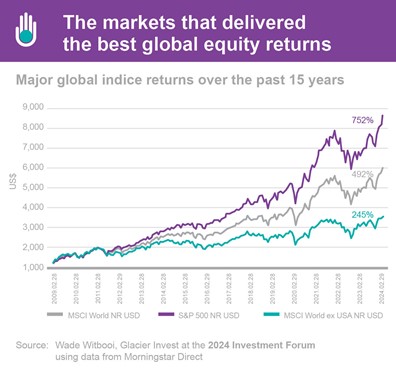

Laura du Preez | 13 March 2024

Laura du Preez has been writing about personal finance topics for more than 20 years, including eight years as personal finance editor for two leading media houses.
A narrow focus when investing in global equity markets may be unwise in the years ahead as investment managers are taking diverging views on how technological and other disruptions will affect shares globally.
![]() Many investors and retirement savers, in both active and index-tracking or passive funds, have enjoyed great returns by being exposed to rapidly rising global equity markets.
Many investors and retirement savers, in both active and index-tracking or passive funds, have enjoyed great returns by being exposed to rapidly rising global equity markets.
But some shares have become expensive, some have lagged, leading to managers taking different views on their future prospects amid interest rate cuts and elections set to take place in many parts of the world. It may be a good time to hedge your bets across managers and investment styles.
At the Investment Forum hosted by the Collaborative Exchange in Cape Town last week and Johannesburg this week, BlackRock one of the world’s largest global managers of both actively managed and passively managed funds, said it was optimistic that good global equity market returns would be sustained on the back of developments in artificial intelligence (AI).
But Orbis, the offshore sister manager to Allan Gray, said it was steering clear of the large tech stocks typically expected to benefit from AI, because they have now reached very high prices relative to expected earnings (valuations). Orbis is finding better-priced investment opportunities in other markets.
 Wade Witbooi portfolio manager at Glacier, said the MSCI World index, a commonly used benchmark for global equities, had shown close to 500 percent growth over the past 15 years, while the S&P500, representing the US market and dominated by the seven large technology companies known as the Magnificent Seven, had returned more than 750 percent over the same period.
Wade Witbooi portfolio manager at Glacier, said the MSCI World index, a commonly used benchmark for global equities, had shown close to 500 percent growth over the past 15 years, while the S&P500, representing the US market and dominated by the seven large technology companies known as the Magnificent Seven, had returned more than 750 percent over the same period.
![]() When US listed shares are excluded from the MSCI World Index, the cumulative return over the past 15 years is less than 250 percent, showing how much heavy lifting the US share market and the dominant tech shares did for the index over this period, he says.
When US listed shares are excluded from the MSCI World Index, the cumulative return over the past 15 years is less than 250 percent, showing how much heavy lifting the US share market and the dominant tech shares did for the index over this period, he says.
Managers need to make calls on whether the share prices of the “Mag Seven” will continue to go up or if they will become the “Lag Seven” in future while shares in the rest of the world catch up, Witbooi said.
Laura Cooper, a senior investment strategist for iShares by BlackRock in Europe, Middle East, and Africa, said BlackRock still preferred US equities over other assets or shares in other regions, as the manager believes the large tech shares’ recent outperformance of all other global shares will persist on the back of developments in artificial intelligence (AI).
She said share valuations matter and are stretched in some pockets of the global equity market, but sometimes it pays to pay up for profitability. The large tech companies have delivered earnings consistently and will continue to do so even if the momentum behind their share prices fades, she said.
Dan Brocklebank, head of Orbis UK, however, says he is skeptical of the technology shares because everyone knows about the investment case for these shares and are heavily invested in them, resulting in this being reflected in the share price.
![]() Orbis would much rather pass on these shares because if their good fortune does not continue, you can lose a lot of money on these shares bought at a high valuation, he said.
Orbis would much rather pass on these shares because if their good fortune does not continue, you can lose a lot of money on these shares bought at a high valuation, he said.
Orbis is instead invested with conviction in other shares that are “unsexy, unglamorous and that no one wants to talk about”, like those of Korean banks, US logistics companies and payment companies that have been sold down on misunderstandings about how newer fintech companies will affect them.
Orbis prefers being a contrarian investor, choosing shares that are not well-covered by other analysts – it currently has its highest tilt to value shares in 30 years, Brocklebank said.
Neil Denman, portfolio manager at UK-based Sarasin & Partners, says Sarasin is a thematic investment house and exploits themes such as digitalisation, automation and ageing. He says Sarasin’s portfolios are overweight to US-listed shares relative to global indices even though the valuations of the shares are very important to the manager.
![]() There are more than just 10 stocks in the US and the country has a wonderful breadth of well-managed businesses and entrepreneurs who are not only taking advantage of opportunities in the US, but globally as well, Denman says.
There are more than just 10 stocks in the US and the country has a wonderful breadth of well-managed businesses and entrepreneurs who are not only taking advantage of opportunities in the US, but globally as well, Denman says.
He says technological advancement and change will bring investment opportunities, drive profitability, earnings and cashflow that will hopefully result in dividends and support for portfolios invested in the US.
Denman says there are plenty of companies that are good value so Sarasin is not worrying about a stock market bubble. The big tech companies are incredibly profitable monopolies and able to buy out their competitors in future which makes for a bright future for companies and the broader economy, he said.
Amadeo Alentorn, the portfolio manager of the Old Mutual Global Equity Fund, said the magnificent seven have benefitted from the optimistic narrative around AI and how it can be deployed in different parts of the global economy.
![]() But it is important to continuously challenge such narratives by analysing the companies behind these shares and their future prospects through what managers call fundamental analysis, he said. It is possible that only some of the seven big tech companies will continue to benefit from the AI boom, he added.
But it is important to continuously challenge such narratives by analysing the companies behind these shares and their future prospects through what managers call fundamental analysis, he said. It is possible that only some of the seven big tech companies will continue to benefit from the AI boom, he added.
Combining fundamental analysis with indicators about investor sentiment can be powerful because while you do not want to follow the herd in investing, you also do not want to be in front of the herd and have it run you over, Alentorn said.
All four managers are looking at the healthcare sector and how it may benefit from AI.
Cooper said it is possible to exploit the AI theme with these shares as well as those of companies involved in semiconductor manufacturers, companies involved in cybersecurity and the legal sector.
Alentorn says investors should consider active managers who can select good shares rather than buy into a passively managed exchange-traded fund tracking the US’s technology-dominated stock market, the Nasdaq. An active manager can balance the risks of being exposed to big tech shares by also investing in healthcare and industrials, he said.
![]() Old Mutual analyses flows into passive investments because they affect sentiment and can provide signals when to buy or sell shares, he said.
Old Mutual analyses flows into passive investments because they affect sentiment and can provide signals when to buy or sell shares, he said.
Cooper says BlackRock sees opportunities in blending active and passive in one investment portfolio.
Brocklebank says passive investments are creating momentum in the market, and a growing amount of capital is being invested into the big indices, which are crowding into the big name shares which are becoming an increasingly small number of stocks.
If you can avoid the FOMO and not be tempted to plunge into them just because everyone else is buying them, and instead buy shares on the basis of good valuations, there are plenty of opportunities elsewhere, he said.
Denman says there are cases for using low-cost investment vehicles like passively managed funds, but you should generally look for managers with good long-term track records and the brain power to consider environmental, social and governance (ESG) investment risks that passive managers find difficult to do. ESG scores are not good enough, he said.
Be wary of the crowding effect in markets and make sure you're properly diversified across managers who do not all own the same shares, Brocklebank said. If everyone owns a great company like Microsoft, incremental growth in its share price will be hard to find, he said.